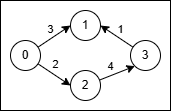LeetCode in Kotlin
3650. Minimum Cost Path with Edge Reversals
Medium
You are given a directed, weighted graph with n nodes labeled from 0 to n - 1, and an array edges where edges[i] = [ui, vi, wi] represents a directed edge from node ui to node vi with cost wi.
Each node ui has a switch that can be used at most once: when you arrive at ui and have not yet used its switch, you may activate it on one of its incoming edges vi → ui reverse that edge to ui → vi and immediately traverse it.
The reversal is only valid for that single move, and using a reversed edge costs 2 * wi.
Return the minimum total cost to travel from node 0 to node n - 1. If it is not possible, return -1.
Example 1:
Input: n = 4, edges = [[0,1,3],[3,1,1],[2,3,4],[0,2,2]]
Output: 5
Explanation:

- Use the path
0 → 1(cost 3). - At node 1 reverse the original edge
3 → 1into1 → 3and traverse it at cost2 * 1 = 2. - Total cost is
3 + 2 = 5.
Example 2:
Input: n = 4, edges = [[0,2,1],[2,1,1],[1,3,1],[2,3,3]]
Output: 3
Explanation:
- No reversal is needed. Take the path
0 → 2(cost 1), then2 → 1(cost 1), then1 → 3(cost 1). - Total cost is
1 + 1 + 1 = 3.
Constraints:
2 <= n <= 5 * 1041 <= edges.length <= 105edges[i] = [ui, vi, wi]0 <= ui, vi <= n - 11 <= wi <= 1000
Solution
import java.util.PriorityQueue
class Solution {
private var cnt = 0
private lateinit var head: IntArray
private lateinit var next: IntArray
private lateinit var to: IntArray
private lateinit var weight: IntArray
private class Dist(var u: Int, var d: Int) : Comparable<Dist> {
override fun compareTo(other: Dist): Int {
return d.toLong().compareTo(other.d.toLong())
}
}
private fun init(n: Int, m: Int) {
head = IntArray(n)
head.fill(-1)
next = IntArray(m)
to = IntArray(m)
weight = IntArray(m)
}
private fun add(u: Int, v: Int, w: Int) {
to[cnt] = v
weight[cnt] = w
next[cnt] = head[u]
head[u] = cnt++
}
private fun dist(s: Int, t: Int, n: Int): Int {
val queue: PriorityQueue<Dist> = PriorityQueue<Dist>()
val dist = IntArray(n)
dist.fill(INF)
dist[s] = 0
queue.add(Dist(s, dist[s]))
while (queue.isNotEmpty()) {
val d = queue.remove()
val u = d.u
if (dist[u] < d.d) {
continue
}
if (u == t) {
return dist[t]
}
var i = head[u]
while (i != -1) {
val v = to[i]
val w = weight[i]
if (dist[v] > dist[u] + w) {
dist[v] = dist[u] + w
queue.add(Dist(v, dist[v]))
}
i = next[i]
}
}
return INF
}
fun minCost(n: Int, edges: Array<IntArray>): Int {
val m = edges.size
init(n, 2 * m)
for (edge in edges) {
val u = edge[0]
val v = edge[1]
val w = edge[2]
add(u, v, w)
add(v, u, 2 * w)
}
val ans = dist(0, n - 1, n)
return if (ans == INF) -1 else ans
}
companion object {
private const val INF = Int.Companion.MAX_VALUE / 2 - 1
}
}

